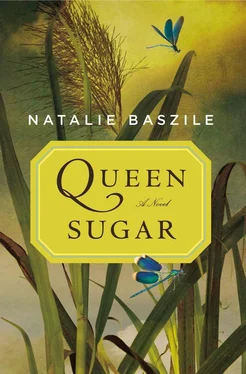• • •
Back at the shop, Charley had just discovered another envelope of invoices Frasier apparently hadn’t bothered to pay, when Denton knocked on her office door. He held her yellow pad. “Here’s what I’ve come up with.”
Charley wheeled around from the desk she’d only partially cleared, gesturing for him to take a seat on the tattered sofa.
“Besides the replacement parts for the machinery,” Denton said, “we’ve got to buy more mother stalk.”
“Mother stalk?”
“That’s the cane you plant at the beginning,” Denton said. “You start by cutting a long piece of cane and laying it on its side in the ground. Every piece of cane has knots on it a few inches apart, sort of like eyes on a potato, and out of those knots, a new cane plant will shoot up. That first shoot, when it grows up tall like you see around here, is called your plant crop. That’s what you harvest during grinding. The next year when that cane sends up another shoot, that’s called first-year stubble. Next year after that, the shoot that comes up is second-year stubble, the next year is third-year, and by the fourth year, that original stalk you planted is pretty much worn out, so you dig it up and start again. You usually get four crops from every mother stalk.”
“So mother stalk is like sourdough starter,” Charley said. “I think I get it.”
“Sort of, I guess,” Denton said, looking puzzled. “You got a lot of third-year stubble out there that’ll need to be replaced. We also need to dig those drains I showed you and fill those ruts in the front quadrant. It’ll cost us, but we can probably find some local labor if we ask around.”
“Local labor?”
Denton looked at Charley over the top of his bifocals. “Black folks.” He flipped the page. “Now, I think I can save the John Deere out front, but you’re gonna need a combine, a chisel plow, and at least two three-row choppers.” He did some final figuring. “We’re looking at one fifty-six.”
“Excuse me?”
“One hundred fifty-six thousand. Give or take.”
Give or take what? Charley wanted to say. My kid? My life? My soul? She felt her knees buckle even though she was sitting down.
“One fifty-fix should do it,” Denton mused, tapping the pad with his pen. “That’ll get us to October. Once grinding starts, we’ll need at least four cane wagons, that’s another twelve, but I saw one out in the yard, so we’ll worry about that later.”
Charley leaned forward, put her head between her legs. And now the ball of twine had not only hit the floor, it was coming apart fast, with little bits of fiber poking out everywhere. “Oh my God. Oh my God. Oh my God.”
“Miss Bordelon?”
“Mr. Denton, I don’t have one hundred fifty-six thousand dollars.”
“How much do you have?”
Between her savings and what was left of the operating fund she had ninety-one thousand dollars — a lot of money if you owned a bakery or a bicycle repair shop, but a pittance, Charley realized now, if you were trying to run an eight-hundred-acre sugarcane farm. “Ninety-one.”
“Ninety-one?”
“Ninety-one,” Charley said again, but it may as well have been ninety-one thousand gum balls.
Denton stared at her a moment longer, then pushed his hat back on his forehead and squeezed his brows together. “What about a line of credit?”
Charley shook her head, no.
“What about cash reserves?”
“These are my reserves.”
“Ninety-one thousand,” Denton said, like she’d just handed him a stack of Monopoly money. “I told you this was no game.”
Charley could practically hear Denton cursing himself for coming out of retirement, kicking himself for buying in. She was on the verge of apologizing, but stopped herself, sensing that if she uttered another word, a single syllable, she’d tip the scales and Denton would walk.
“You can hardly find a decent used combine for ninety-one thousand,” Denton said. He sighed the heaviest sigh Charley had ever heard, and set the yellow pad on the floor.
On the other side of the window, a dragonfly bobbed along the glass.
“I understand if you don’t want to work with me,” Charley said. She pulled a crumpled Ag bulletin off the stack, folded the first page over, and stared at the columns of print, not reading any of it, because it was easier, less agonizing than watching the disappointment register across Denton’s face.
Denton slid forward on the threadbare couch. He rested his elbows on his knees and let his head hang. He didn’t say anything for a very long time. “Well,” he said, finally, looking up, the skin around his eyes seeming to sag. “Put your thinking cap on, Miss Bordelon, and roll up your sleeves, because we’re about to get real creative.”
• • •
By five thirty, the air was heavy with the promise of rain, and every muscle in Charley’s back ached as she slid the shop door closed. She had spent the afternoon cleaning out boxes of yellowed files, scraping crud from the windows, hauling hoses, and lifting crates of old parts. She’d swept the floors and dragged impossibly heavy barrels of solvent out into the yard. Oil blackened the knees of her jeans. Her shirt was streaked with soot. It would take the rest of the week to clean up everything, Charley decided, and she might as well burn her clothes.
“I’ll stop by the dealer tomorrow to see if they can order that distributor cap,” Denton said, standing aside as she looped the chain through the handle, secured the lock.
Charley nodded. She was more grateful than she could say that Denton had decided to stick with her, that he hadn’t bailed out when he’d had the chance. She was even happy they’d accomplished so much on their first day. It felt good to be productive, to push herself to the point of exhaustion. But privately, Charley nursed the growing suspicion that it was all for naught because no matter how hard they worked, how much they schemed, she didn’t have the money Denton said they needed. I’ll stop by the dealer tomorrow , Denton had said. Two weeks ago, she would have considered the word tomorrow to be the loveliest she could utter, filled with possibility, and opportunity, and promise. But as far as she could tell, tomorrow only meant she’d had another chance to disappoint him.
“Have a good evening, Mr. Denton,” Charley said, sliding in behind the wheel. “And thank you.” She followed Denton’s truck along the headland, past the fronts of untended third-year stubble until they reached the junction, then tapped her horn twice to wish Denton a good night before turning left and bumping over the drawbridge. Up ahead, the sky was the color of gunmetal, the clouds heavy with rain. Lightning slashed through them and their lining glowed white. Nine miles down the road, the sky opened up, soaking the road until it was black. By the time Charley pulled up at Miss Honey’s, the Volvo’s hood glistened like it had just been waxed, and steam rose from it in misty sheets.
• • •
Miss Honey was chopping like a prep cook at a roadside diner, scraps of bell pepper, garlic, and onion scattered across the counter, when Charley walked in.
“Where’s Micah?” Charley asked.
Miss Honey gestured toward the window, and when Charley looked out, she saw Micah in jean cutoffs she must have made herself that morning, digging a long, rectangular plot in the grass.
“I convinced her to come in when it rained, but otherwise, she’s been out there all day,” Miss Honey said, and alongside the swell of pride Charley felt at Micah’s industriousness, she felt a pinch of guilt. Since the reunion, Micah hadn’t played with a single kid even though Charley promised, swore , she’d help her find some.
Читать дальше












